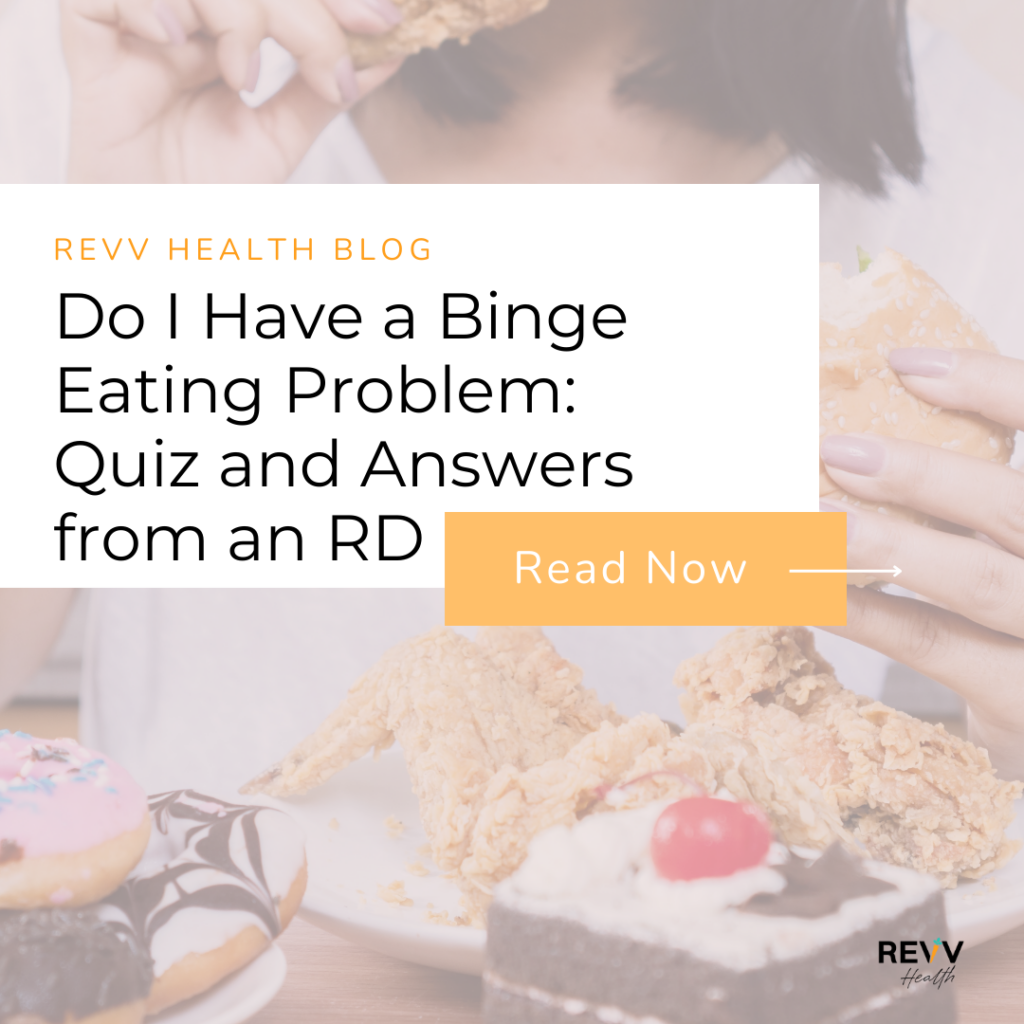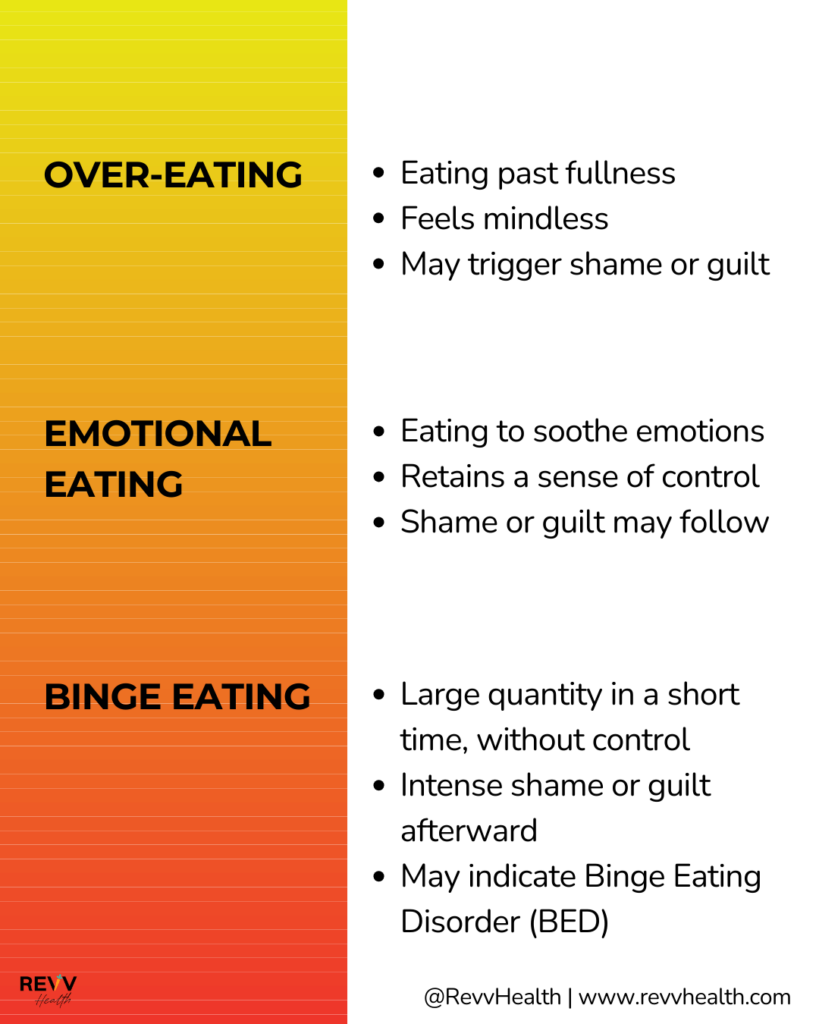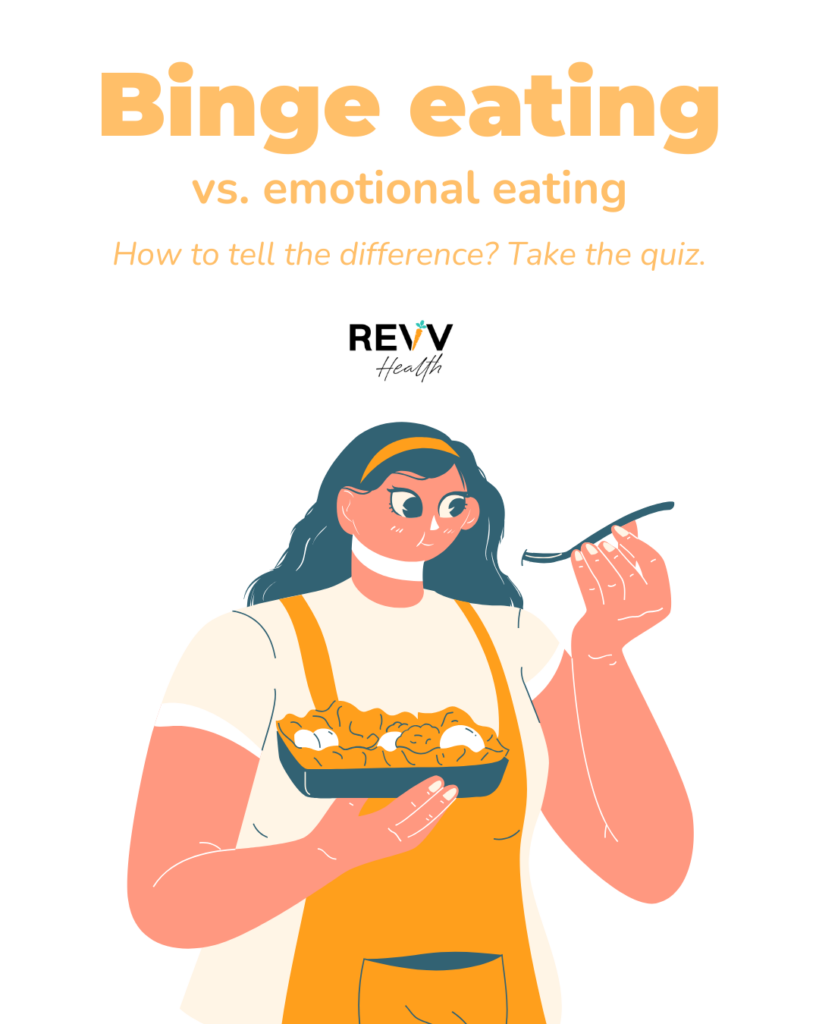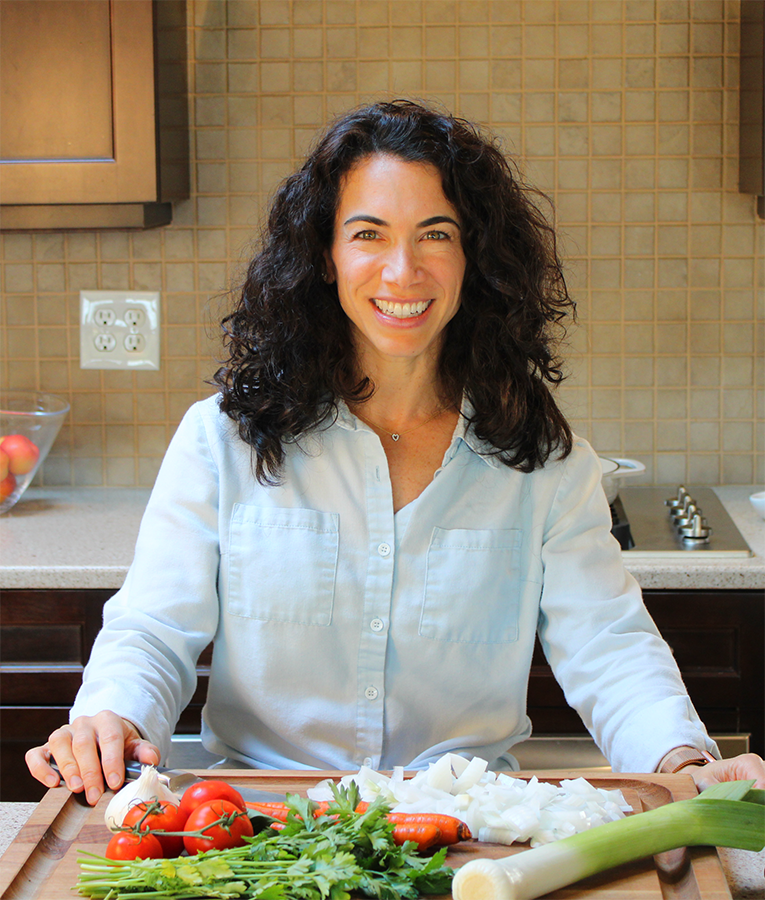Main insights
- Learn the difference: emotional eating is often tied to stress or comfort. Binge eating involves feeling out of control with food, occurring once per week or more times for three months.
- Take the “do I have a binge eating problem quiz”: find out if you might have a binge eating problem.
- Get treatment: get support from a non-diet dietitian to help you build a healthier relationship with food.
Ever had one of those moments where you’re elbow-deep in a bag of chips before realizing, whoa, where did it all go?
Or maybe you’ve found yourself striking bottom on a pint of ice cream after a long day…when you only meant to have a few bites?
Trust me, I get it. We’ve all been there! But how do you know if your eating pattern sounds like a “treat” or if it is something more serious? I’m here to help with that, today!
If you’re new here, hello! I’m Marissa, a registered dietitian nutritionist (RDN), parent nutrition coach, and eating disorder specialist.
If you’re having a tough time with emotional eating, binge eating, or just feeling out of control with food, this blog will help you get to the bottom of what might be going on.
I’ll walk you through how to know if you have a binge eating problem and the main differences between emotional eating and binge eating. Then, you’ll have the chance to take my thorough quiz below to find the right next steps for you.
Understanding binge eating vs. emotional eating
Binge eating and emotional eating can sound similar, but they’re different in a few major ways.
Binge eating
Binge eating usually involves eating an objectively large amount of food in a short period, along with an overwhelming feeling that you can’t stop (even if you want to). When it happens regularly, it’s diagnosed as binge eating disorder (BED) by a therapist or doctor.
Emotional eating
Emotional eating, on the other hand, is reaching for food to soothe feelings like stress, boredom, or sadness. It might be easier to stop in the moment than bingeing, but frequent emotional eating episodes can sometimes lead to more harmful eating behaviors over time.
If you’re wondering how to tell them apart, a big difference is control.
Emotional eating generally has a more intentional start and stop, whereas binge eating comes with an intense loss of control. And while it’s normal to eat for comfort occasionally, binge eating is more frequent and can leave you feeling physically and emotionally drained.
Why it’s not so black-and-white
When it comes to eating behaviors, things are rarely as simple as “this or that.”
Many people find themselves somewhere on a spectrum that includes overeating, emotional eating, and bingeing. And sometimes, it can be hard to tell where one ends and the other begins.
On this spectrum, you’ll find overlapping traits: eating for comfort or relief, experiencing some level of guilt afterward, and feeling a loss of control.
The distinctions often come down to the frequency, quantity, and the intensity of those feelings.
This gray area is why so many people find their eating behaviors confusing. Just know that it’s possible to experience a mix of all of these behaviors at different times, especially when stress or life events change how we relate to food.
Is emotional eating “bad”?
Many people emotionally eat from time to time: it’s a normal response to stress, boredom, or even happiness.
As I often tell my clients, there can be positives to emotional eating: it can offer a bit of comfort and take the edge off, similar to enjoying an alcoholic drink in moderation.
The bottom line: eating emotionally is totally normal.
Where it gets tricky is when emotional eating becomes a frequent, almost automatic way to handle tough emotions, and the main way you get relief. (Or, if emotional eating is the ONLY tool you have in your tool box to self-soothe.) See 12 Tips to Learn How to Stop Eating When Bored.
Or, when it starts feeling out of control. At that point, it may start to look more like binge eating.
The quiz in this article, entitled “do I have a binge eating problem quiz” can help you explore where your eating patterns may fall, so you can decide if it’s time for extra support.
How the quiz can help you understand your eating patterns
While this article isn’t meant to encourage self-diagnosis – neither you nor I are medical doctors – sometimes it’s helpful to gather insights and reflect before scheduling a session with a professional.
If you’re curious whether your eating habits might be leaning toward binge eating, this “do I have a binge eating problem quiz” is designed to help you explore your relationship with food, whether it’s occasional emotional eating or something that feels a bit more intense.
In just a few minutes, you’ll:
- Learn if your eating patterns align with binge eating tendencies
- Understand where you fall on the spectrum between emotional eating and binge eating
- Receive practical next steps based on your results
Ready to dive in now? Click here to take the “do I have a binge eating problem quiz” and start gaining valuable insight into your eating patterns.
Quiz results: what your answers might tell you
Here’s a quick guide to help you interpret your “do I have a binge eating problem quiz” results and figure out your next steps:
- If you answered mostly yes: this could be a sign that binge eating is a bigger part of your life. Consider reaching out to a professional, like an eating disorder dietitian or therapist, who can help you get a full picture and support you in taking steps toward balance.
- If you answered yes sometimes: you may notice some patterns that lean toward binge eating, but they might not be as frequent or intense. You can still benefit from working with a non-diet dietitian. Try focusing on mindfulness practices for emotional eating, gentle nutrition, or journaling to connect with your emotions around food.
- If you answered mostly no: you’re likely dealing with emotional eating, which happens to everyone now and then. Enjoying food for comfort is okay! Just keep an eye on your habits and make sure it doesn’t become your main coping method. If you’d like support with navigating your nutrition and eating habits, I can help.
How to know when it’s time to get help
So, how do you know when it’s time to reach out for some extra help?
Binge eating and emotional eating can feel like they’re on a sliding scale. Sometimes, what starts as a bit of stress-snacking can turn into something that feels harder to control.
If you’re finding that the sheer act of eating is taking over more of your day than you’d like, or if emotional or binge eating is affecting your health or mood, it might be time to talk to someone.
Connecting with a registered dietitian skilled in eating disorders (ahem, like me!), therapist, and doctor can be a huge help in untangling these habits and finding a way forward that feels healthier and more balanced.
Remember, you don’t have to figure it all out on your own!
How I work with clients to explore a binge eating problem
Whether my clients feel unhappy about their emotional eating or bingeing, we dive into the details of these eating episodes with non-diet work.
- We talk through the triggers and urges to eat.
- We notice how they feel during and after, and whether they notice a loss of control.
- We also explore what is underneath these episodes: soothing emotions, managing stress, seeking a moment of relief, or something more.
I often encourage clients to keep a journal, noting emotions and patterns around these episodes, which can lead to powerful “aha” moments as they start connecting specific feelings with eating behaviors.
Additionally, we look at hunger cues, fullness, overall eating patterns, and the level of “control” they feel around different foods.
Many times, just bringing awareness to eating patterns can help my clients begin to see if their habits align more with emotional eating or binge eating.
Wrapping it all up and next steps!
In this article, we explored the differences between emotional eating and binge eating, discussed what it means to feel out of control around food, and introduced a quiz to help you gain personal insights into your eating habits.
If you’re ready to take the next step, the quiz offers a tailored look at your patterns with suggestions based on your answers. Whether you’re looking to explore self-care tools, get support, or simply understand yourself better, this quiz can be a helpful first step on your journey.
Click here to take the “do I have a binge eating problem quiz” and start learning what your eating habits might be telling you.





0 Comments